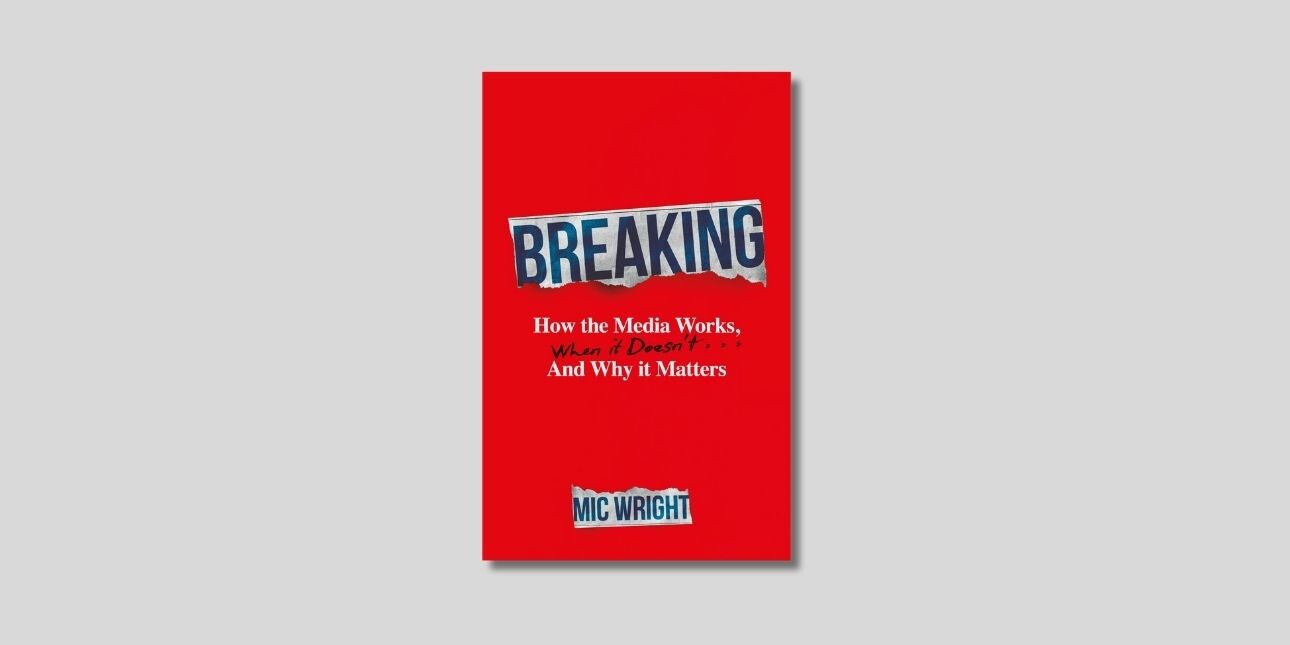Breaking: How the Media Works, When It Doesn’t… And Why It Matters
Mic Wright’s sharp, witty, and deeply researched insider’s reckoning with British journalism’s fractured realities, exposes the hidden biases, pressures, and power games that shape the news we consume.
“You cannot hope to bribe or twist
thank God! The British journalist
But, seeing what the man will do
unbribed, there’s no occasion to”
The English poet Humbert Wolfe may have penned this well-known epigram back in the 1920s, but it’s also a perfect summation of Mic Wright’s exposé of 21st-century journalism, Breaking: How The Media Works, When It Doesn’t… And Why It Matters.
Today’s journalists may well pride themselves on their ability to ‘speak truth to power’, but as Wright details here, their actual conduct – routinely compromised by ‘invisible’ pressures such as ownership interests, editorial expectations, market forces, and their own self-censorship – renders direct bribery, as Wolfe’s words suggest, quite unnecessary.
And it’s these inherent flaws that Wright critiques in this scrupulous and urgent exploration of the modern British media scene, balancing hard-hitting critique with wit and heartfelt respect for the art of journalism. It’s a book, as the celebrated broadcaster Samira Ahmed says, “brimming with intelligence, energy, ethics and impeccable research, re-visiting major news stories of recent decades with a fresh eye and drawing lessons for today”.
A seasoned journalist
Wright is uniquely placed to write this – no mere armchair polemicist or ‘social media warrior’, he’s a seasoned journo and media critic with over 15 years’ experience (he’s appeared in every national newspaper “besides the Daily Mail and Daily Sport”) and founder of the acclaimed media criticism newsletter, Conquest of the Useless.
His central thesis is that the journalist’s oft-claim, “no one tells me what to write,” masks the invisible constraints shaping their work; and over its 300 odd pages, he painstakingly exposes how editorial lines, ownership oligarchies, and economic realities quietly but powerfully govern what is reported and how.
Naturally, Rupert Murdoch’s empire looms large as an example of this structural control – as writer David Stubbs observes, the book “wages righteous war against ever increasing armies of bad faith right wing hacks churning out columns of cynically targeted bigotry for money”. But Wright shows that this is really a systemic issue spanning public broadcasters such as the BBC and ostensibly ‘independent’ or ‘centrist’ print titles.
Fact, spin and honest journalism
Where Breaking… particularly shines is in its fresh take on media literacy: Wright equips readers with the tools to better interpret the flood of news and opinion, helping distinguish fact from spin, and honest journalism from cynical agenda-setting – in the process making dense media mechanics accessible and engaging, and often laugh-out-loud funny.
He’s no bitter whistle-blower either: Wright is at pains to maintain that despite its numerous faults and failures, journalism remains vital to a functioning democracy, and he ably captures its human (all too human) side – the camaraderie, the struggles, and occasional quiet heroism within our newsrooms.
Breaking… arrives at a critical moment. In an era of political gaslighting, polarisation, and public distrust, understanding how the media works – and where it falters – is vital. This terrific book reminds us that a broken press imperils the very foundation of truth in society. As Ahmed says, it’s “an essential read right now for both journalists and anyone who cares about the art of news.”
- Breaking: How the Media Works, When It Doesn’t… And Why It Matters is out now, published by Blink Publishing.

Ali Catterall is an award-winning writer, journalist and filmmaker whose writing has featured in the Guardian, Time Out, GQ, Film4, Word magazine and the Big Issue, among many others. Ali is also the writer and director of the 2023 film Scala!!!
More book reviews
Empire of AI by Karen Hao – book review
Best summer reads: Books recommended by PR professionals
Moral Ambition: Stop wasting your talent and start making a difference

